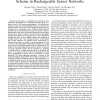Free Online Productivity Tools
i2Speak
i2Symbol
i2OCR
iTex2Img
iWeb2Print
iWeb2Shot
i2Type
iPdf2Split
iPdf2Merge
i2Bopomofo
i2Arabic
i2Style
i2Image
i2PDF
iLatex2Rtf
Sci2ools
INFOCOM
2011
IEEE
2011
IEEE
Finite-horizon energy allocation and routing scheme in rechargeable sensor networks
Abstract—In this paper, we investigate the problem of maximizing the throughput over a finite-horizon time period for a sensor network with energy replenishment. The finite-horizon problem is important and challenging because it necessitates optimizing metrics over the short term rather than metrics that are averaged over a long period of time. Unlike the infinite-horizon problem, the fact that inefficiencies cannot be made to vanish to infinitesimally small values, means that the finite-horizon problem requires more delicate control. The finite-horizon throughput optimization problem can be formulated as a convex optimization problem, but turns out to be highly complex. The complexity is brought about by the “time coupling property,” which implies that current decisions can influence future performance. To address this problem, we employ a three-step approach. First, we focus on the throughput maximization problem for a single node with renewable energy assuming that the repleni...
| Added | 30 Aug 2011 |
| Updated | 30 Aug 2011 |
| Type | Journal |
| Year | 2011 |
| Where | INFOCOM |
| Authors | Shengbo Chen, Prasun Sinha, Ness B. Shroff, Changhee Joo |
Comments (0)

